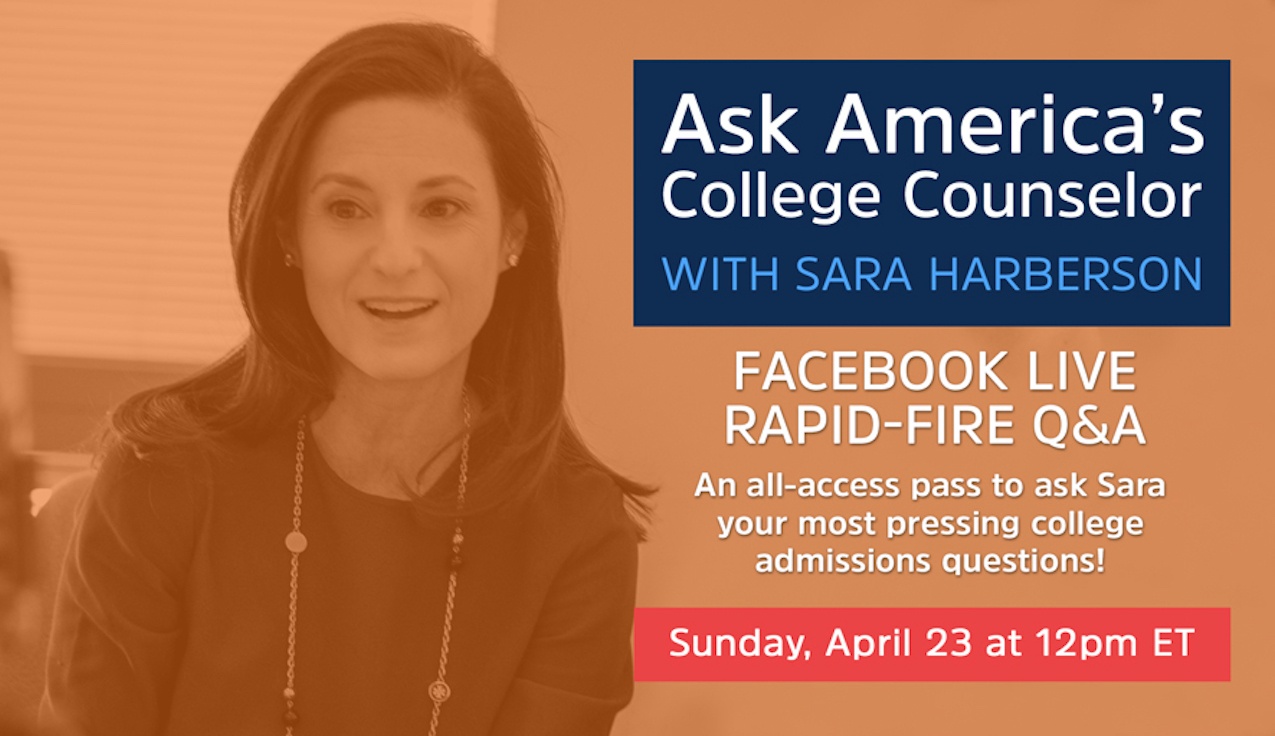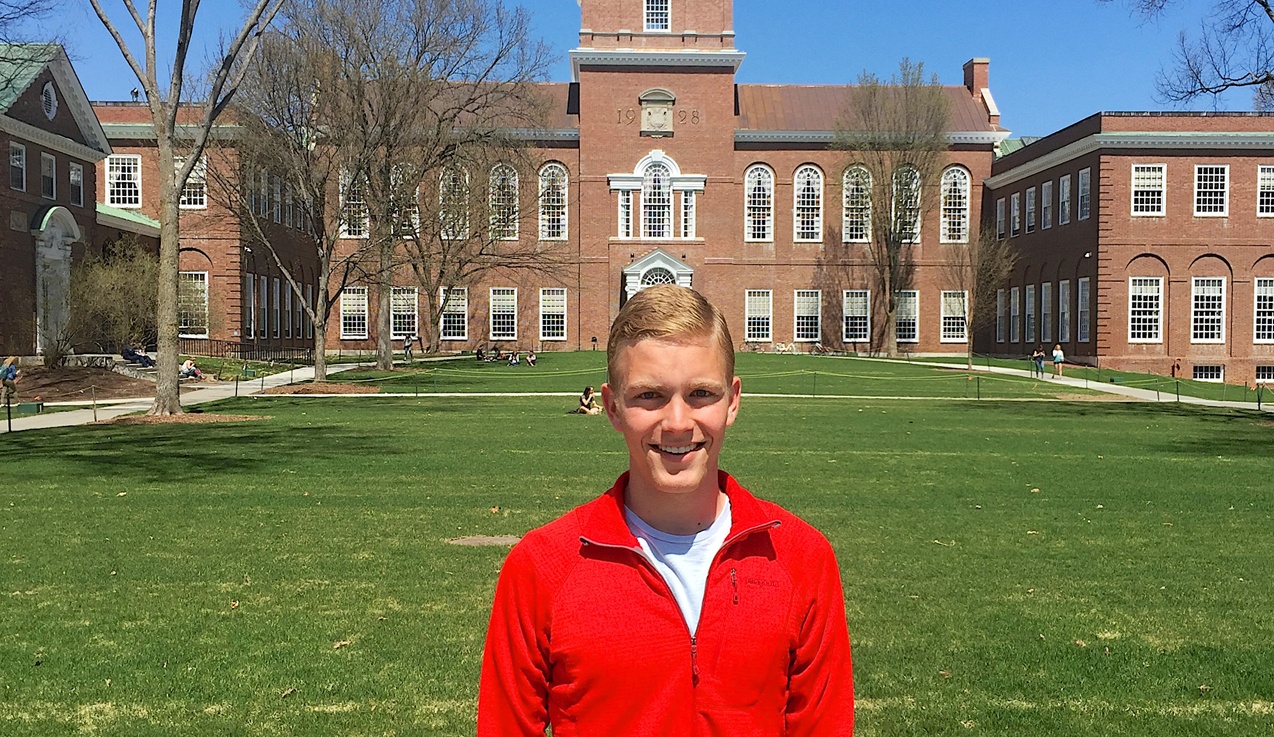In case you missed it, here's a recap of my recent Facebook Live Rapid-Fire Q&A!
My rapid-fire FB Live Q&A called Ask America's College Counselor is a great opportunity for parents of high school and middle school students as well as students themselves to ask me anything about the college admissions process. In my videos, I answer all of your questions on what you can do to positively impact your college admissions process. If you didn't get to see my most recent live stream, you can watch the video below. And don't forget to scroll down to the BONUS section for even more information!
QUESTIONS YOU'LL SEE ME ANSWER:
Choosing a College and the College Admissions Process
- What are the pros and cons of an engineering 3-2 program offered at liberal arts colleges?
- Should you “double deposit” in order to secure your spot while you make your decision on which college to attend?
- Regarding the SAT and ACT scores, what are highly selective colleges looking for?
- What’s the best piece of advice for choosing a college when you don’t have a "gut feeling” about any of your options?
- How do the essay or writing portions of the SAT/ACT factor into the admissions process at highly selective schools?
- Do colleges consider your intended major when looking at your total SAT score?
- Will the delayed release of recommendations and transcripts by a high school negatively affect a student’s rolling admissions application status?
- For a student interested in med school, is it a good strategy to attend a less challenging school to increase a student’s chance of being at the top of their class?
- Are certain majors easier to get into?
- Should a student choose an intended major even if they are truly undecided?
College Preparation While in High School
- Do colleges only look at SAT/ACT scores? Do they look at extracurricular activities too?
- What's the best summer activity for a junior?
- Is being a summer camp counselor considered a good use of time for a high school junior?
- What should a student be doing in between their freshman and sophomore year? Is it too early to look at colleges?
- Is it OK to get a recommendation from a sophomore year teacher with whom a student has a very strong relationship?
- Do colleges look at pre-med extracurriculars and programs like the Boston leadership program for neuroscience?
- Would switching or discontinuing a performance group/activity in high school be viewed poorly in the eyes of a college with a high-caliber musical theatre program?
BONUS Q&A- BIG QUESTIONS THAT DIDN'T MAKE THE VIDEO
1. Can you trust mainstream news outlets like US News and Forbes to provide accurate college rankings?
Rankings are tough. I still look at them because I like to see how different publications view the colleges. I look at US News more than any of them because the professionals in the field (college presidents, deans of admissions, etc.) are judging them. In the end, though, rankings can help shape an initial college list, but I don't recommend that it dictate a student's final decision about where to enroll.
2. What are admissions officers looking for when speaking to students? How can students best prepare for an interview?
Interviews are especially important at small liberal arts colleges. These institutions typically offer on-campus interviews with an admissions officer, senior intern, or other staff member. Interviews for small liberal arts colleges can/should be done before the student applies. Larger universities sometimes offer interviews in a student's local area once the student applies. They are typically conducted by alumni volunteers. These interviews are optional because they can't interview everyone who applies. But if a student has an opportunity to interview, they should always say "yes." Preparing for these interviews is important. The student needs to have a clear reason for why they're interested in the college. They can check out the college's website to get a better sense of the academic and extracurricular opportunities at the college. The student should also be ready to talk about themselves—their high school, community, academic interests, extracurricular passions, etc. The student should always be ready to ask the interviewer a question about the institution.
3. What information should a student provide when asking a teacher for a recommendation letter?
This is an important question. I am not a fan of a student providing the teacher with a resume. The teacher tends to use this as a crutch and the letter just repeats the student's activities instead of writing about what makes the student special. I recommend that the student share the reasons why they are asking the teacher for a letter of recommendation—it could be that they found their intellectual footing in the class, they want to major in that area, or that the teacher has seen them in and out of the classroom. The student should provide specific moments in the year that have shaped them— a specific lab when the student did their best work, a paper that turned out to be the best the teacher had ever read, or a critical discussion when the student emerged as a thought leader. Once the teacher agrees to write for the student, I recommend that the student follow it up with an email that includes the things/moments that they are most proud of. This will help the teacher as they write the letter. Here's a little tip too—there's no need to have the teacher write a specific letter for the student's Early Decision or Early Action program. If the student doesn't get admitted, that letter tends to get sent to all the colleges the student is applying to. Usually, this mistake isn't caught until it's too late. Colleges feel like the student's back-up choice when a letter includes another college in it.












